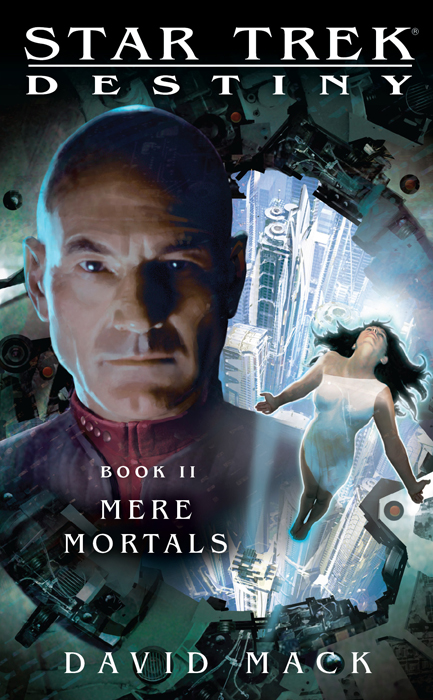Mere Mortals is the second in the Star Trek: Destiny series. It's also my favorite of the three books, nicely ratcheting up the tension while preparing us for the big finale. The Borg have fully invaded the Federation and things are crumbling down our heroes' heads. I admit, part of my joy from this book comes from the glee of seeing Worf fight a Hirogen in a completely unnecessary but quite amusing side-adventure.
Digression: I feel terrible for Worf. Worf is a bit like Wolverine in that he's constantly trying to fight the latest monster of the week but he always gets beaten up by it. It's nice to see him actually win but, against the Hirogen, Worf may be outmatched again! Read to find out if I'm right!
Mere Mortals' premise is that Captain Picard and Ezri Dax have found a series of subspace tunnels which have the potential of shifting the tide of the war. Captain Picard wants them destroyed but the other members of Starfleet are aghast at this discovery's potential destruction.
It's an interesting moral dilemma. The Borg aren't actually using the subspace tunnels, but they could, and this would make it even easier for them to wipe out humanity. On the other hand, destroying them for a relatively minor strategic advantage is an immense waste. It's a bit like finding a bunch of high-ranking Nazis hanging around in the Sphinx.
This dilemma is contrasted against Captain Riker and Deanna Troi's situation. Due to their investigations, they've become prisoners of the Caeliar just as the crew of the Columbia became two centuries ago. Despite the advances the Federation has made, they might as well be guests of Q for how powerful the Caeliar are.
Worse, due to the events of the previous book, there's no chance of persuading them to leave. Ultimately, the choice Riker has to make is agonizing but reminds me of "Best of Both Worlds", illustrating exactly why Number One has it in him to sit in the Captain's chair.
I will say the continuing pregnancy plot of Deanna Troi annoys me. Her refusal to terminate her pregnancy despite the potential to kill her and unsustainable nature of the fetus seems like bad medical advice. In Star Trek, of course, miracles are possible but this is a bit like a Star Trek character refusing to do surgery on a child because he's sure space magic will cure him.
My favorite part of the book, though, is watching Captain Erika Hernandez cope with being a prisoner of the Caeliar for the rest of her natural life. The book shows the agony of the Columbia's surviving crew as they are forced to watch months turn into years turn into decades as any hope of escape is ground down.
Erika Hernandez is a complicated character as she's able to bond with the Caeliar in a way her crew can't and this occasionally makes her an unsympathetic character. Erika Hernandez might have decided to stay with the Caeliar of her own free will but the others hate them for holding them indefinitely, despite there being no malice. Erika, herself, starts to comprehend this only after her crew begins dying off. Watching her rediscover her humanity at the end was genuinely heartwarming. At the end of the day, she's a human not a Caeliar.
Speaking of the Caeliar, I like how this book expands on their perspective a bit. They're a deeply flawed race. Whereas other science fiction authors might portray them as perfect or hopefully flawed, their xenophobia and arrogance are nicely balanced against their more positive qualities. They're an obsessive, almost machine-like, race whose desire for perfection doesn't make them bad but unlikeable. We never get the impression they're not worthy of life, but we do acknowledge they're not saints or as smart as they think they are.
Another part of the book I absolutely adored was watching President Bacco attempting to find a diplomatic solution to all of the Alpha and Beta Quadrant's disparate problems so they can face the Borg together. In this, President Bacco remains blameless but you'd think she'd murdered the Tholian hatchery worlds by the way some of the "enemy races" react to her actions. While Star Trek is a poor place for moral ambiguity, I do find the consequences of these actions rather peculiar in the face of the Borg invasion.
The grand finale of the book nicely sets things up for the series' conclusion. Everything seems lost and there is only the barest hints that things will turn out for the better. Of course, we the audience know they're not going to destroy the Federation and replace it with a Borg-run universe but the NJO warped everything decent about Star Wars so you never know.
In conclusion, I'll say I'm anxious to see how things turn out. Bravo!
10/10

No comments:
Post a Comment
Note: Only a member of this blog may post a comment.